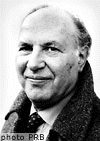The Last Word: Imre Kertész
A Voice of Conscience
by
Stefan Theil
NEWSWEEK INTERNATIONAL

Dec.
2002 -- For decades, novelist Imre Kertesz
was unknown even in his native Hungary. When
he published a semiautobiographical novel in
1975 called "Fateless," it went almost
unnoticed. But two weeks ago Kertesz made
literary history when the Swedish Academy
awarded him this year's Nobel Prize in
Literature, primarily for the moving book,
in which he chronicles the year he spent as
a young Jew in Nazi concentration camps
during World War II. It is the first work in
Hungarian and the first to deal with the
Holocaust to win the honor. Kertesz spoke
with NEWSWEEK's Stefan Theil after picking
up the award. Excerpts:
Q:You've
said you feel lucky to have been at
Auschwitz. Please excuse me for finding that
shocking.
A: I experienced my
most radical moments of happiness in the
concentration camp. You cannot imagine what
it's like to be allowed to lie in the camp's
hospital, or to have a 10-minute break from
indescribable labor. To be very close to
death is also a kind of happiness. Just
surviving becomes the greatest freedom of
all.
Q: Your writing focuses on the
Holocaust, which you say is a legacy for all
of Europe.
A: Auschwitz is the
ultimate embodiment of a radically new event
in European history: totalitarian
dictatorship. Europe's 20th-century
totalitarianisms [fascism and communism]
created a completely new type of human
being. They forced a person to choose in a
way we were never forced to choose before:
to become either a victim or a perpetrator.
Even surviving involved collaboration,
compromises you had to make if you wanted to
bring a bigger piece of bread home to your
family. This choice has deformed millions of
Europeans.
Q: But didn't Europe's age of
totalitarianism end in1989?
A: After 1989, no one
accepted that they made the choice to
collaborate. Overnight everyone became a
dissident. One lie replaced the other, and
that's a problem all of Eastern Europe still
has to deal with.
Q: After decades of being cut off
from the West by the Iron Curtain your
native Hungary will join the European Union
in 2004. Is Europe's long division now over?
A: We might be
growing back together economically, but
there are a lot of psychological traumas we
haven't dealt with. The old nationalisms
that exploded in the Balkan wars are an
example of that. And Eastern Europe doesn't
trust the EU, which waited much too long
after 1989 to reach out. Back then we were
all enthusiastic about a reunited Europe,
and what happened? Instead we all watched
powerlessly as Europe let genocide happen
once again. We might have a Europe of
financial and economic ties, but a European
spirit, an identity that binds us together
beyond our individual nationalisms, has yet
to be born.
Q: There's a lot of talk these days
about Europe's identity and values diverging
from America's.
A: We need to define
a European identity that loves America,
because Europe stands in America's debt. I
will never forget the day the U.S. Army
liberated me from Buchenwald. Only America's
protection during the cold war made it
possible for Germany to find its peaceful
place among Western nations and finally make
amends with France. And let's not forget
that America is built upon the most
beautiful of Europe's ideals.
Q: The new century brought us a new
kind of horror: terrorism.
A: In America and the
West, democracy was able to outlive
Stalinism and the threat of a third world
war. We must make sure that it survives
terrorism, too. Terror is like
totalitarianism in that it can take control
of our lives -- and then life would get
very, very dark. Strangely, we Europeans can
no longer imagine blowing ourselves up in a
crowded bus, but it was in 19th-century
Europe where modern terrorism was born. The
conflict not between nations but between
rationalism and fanaticism, between cultures
that cannot understand each other is very,
very dangerous. The whole subject is a
jungle of worries and questions, full of
thick roots to trip over and wild animals
that stare us in the face.
Q: You're the first Hungarian to win
a Nobel literature prize. How is it to be
getting a hero's welcome?
A: It's very strange
for me because I'm certainly no hero. I've
always looked on my writing as a very
private matter. For decades I had no
audience and lived on the fringes of
society.
Q: You've said that it's easier to
write literature in a dictatorship than in a
democracy.
A: That was too
sweeping a statement, but there's a truth to
it. Because I didn't write what the
communist government wanted to see, I was
cut off and alone with my work. I never
thought my book would ever be published, and
so I had the freedom to write as radically
as I wanted, to go as deep inside as I
wanted. In a democracy you have to find a
market niche, make sure a novel is
"interesting" and "spectacular." That may be
the toughest censorship of all.